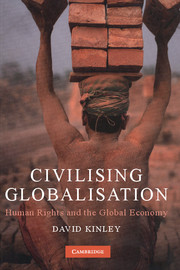2 - Trade and human rights
Published online by Cambridge University Press: 05 June 2012
Summary
Introduction
In the late nineteenth century, when faced with difficulties in establishing trading relations with the tiny island states of the South Pacific that were effectively self-sufficient, early German trading magnates had a neat solution. They simply created demand. They set up so-called ‘smoking schools’ to teach the locals how to smoke tobacco and thereby to inculcate in them the habit. The company dispensed free pipes and tobacco and manufactured an aura that cigarette smoking was not only pleasurable, but sophisticated and a symbol of status. The ploy worked and trade began to flourish as the islanders imported tobacco products paid for by exports of such natural resources as copra, exotic fruits, timber, herbs and spices, and phosphate.
This discomforting tale casts light on two fundamental features of international trade and its relationship with human rights. First it shows that it is corporations and not states that do the trading, even if it is states that must establish the rules of international trade and police their observance. This adjectival role of states – individually and by way of their multilateral creations (for example, the WTO, the EU, the North American Free Trade Agreement (NAFTA) and the Asia-Pacific Economic Cooperation (APEC)) – is key to understanding how international trade laws work and what legitimate expectations might be required of such trading bodies as listed above in support of human rights. This is a theme traced through this chapter.
- Type
- Chapter
- Information
- Civilising GlobalisationHuman Rights and the Global Economy, pp. 37 - 92Publisher: Cambridge University PressPrint publication year: 2009



